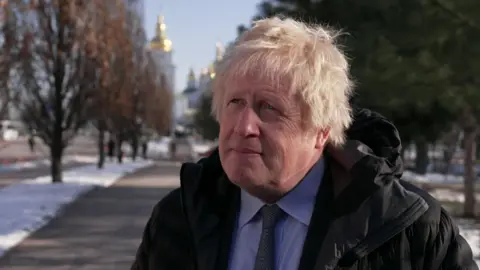Boris Johnson backs Ukraine-US minerals deal
Political reporter
Ukraine correspondent
 BBC
BBCFormer Prime Minister Boris Johnson has urged President Volodymyr Zelensky to secure Ukraine’s future by signing a minerals deal with the US.
Johnson said he believed Ukraine would sign a “promising” agreement to give the US access to valuable minerals, in return for security guarantees.
He spoke to the BBC in Kyiv, where European leaders are meeting to show support for Ukraine on the third anniversary of Russia’s full-scale invasion of the country.
Zelensky had rejected a £400bn ($500bn) demand for mineral wealth, but over the weekend, US officials said they expected to sign a deal this week.
On Sunday, President Zelensky suggested talks had progressed, but rejected any agreement that would have to be “repaid by generations and generations of Ukrainians”.
Ukraine holds huge deposits of critical elements and minerals thought to be worth billions of dollars, including lithium and titanium, as well as sizeable quantities of coal, gas, oil and uranium.
US President Donald Trump has been pushing for a quick deal to end the war in Ukraine, and the country’s mineral wealth has been a key part of discussions.
The US and Russia have held initial talks, which excluded Ukraine and European countries, leaving them scrambling to put forward their own proposals for ending the war and keeping Russia at bay.
There have been diplomatic tensions since President Trump called Zelensky a “dictator without elections” last week.
Ukraine’s elections are suspended under martial law, which has been in place since Russia’s full-scale invasion was launched in February 2022.
Speaking to the BBC, Johnson – a Zelensky ally who was prime minister when the invasion started – said claims by some Americans that Ukraine had provoked the war were “a complete inversion of the truth”.
He described Trump’s comments as “Orwellian”, and said he might as well have blamed the US for the Japanese attack on Pearl Harbor during World War Two.
But Johnson said it was important to focus on a minerals deal, which he called “the great prize”.
He rejected suggestions the deal was a “rip-off” and said “what the Ukrainians get from this is a United States commitment under Donald Trump to a free, sovereign and secure Ukraine”.
“I hope and believe that today, this week, that agreement is going to be signed,” Johnson said.
In a post on X, Olha Stefanishyna, Ukraine’s deputy prime minister for European and Euro-Atlantic Integration, said the Ukrainian and US teams were “in the final stages of negotiations regarding the minerals agreement”.
She posted: “We are committed to completing this swiftly.”
Zelensky is meeting Western leaders on Monday, some in person in Kyiv and some online, as they work out how to provide a post-war security where the US will not.
The Ukrainian leader said the topic of his country joining the Nato military alliance would be “on the table”.
On Sunday he said he would be willing to “give up” his presidency in exchange for peace, adding: “I can trade it for Nato membership.”
French President Emmanuel Macron is expected to visit Washington on Monday, while UK Prime Minister Sir Keir Starmer will be there on Thursday.
Sir Keir has publicly backed Zelensky and offered the UK’s “ironclad support” for Ukraine.
He is expected to discuss the importance of Ukraine’s independence, US security guarantees and European involvement in peace talks when he speaks to Trump.
Sir Keir spoke over the phone to President Macron on Sunday. Government sources told the BBC the leaders “compared notes” on how best to approach President Trump.
British officials said the prime minister is keen for European military powers to present a co-ordinated pitch to the US president, and also discuss economic issues, including tariffs.
In the meantime, Sir Keir is expected to address leaders from the G7 and across Europe on Monday, as part of a group call in a show of solidarity amid fragile transatlantic relations.
Meanwhile, the Home Office has announced a move to widen travel sanctions for Kremlin-linked elites.
Additional reporting by Joe Pike, political correspondent
Published at Mon, 24 Feb 2025 11:17:16 +0000

